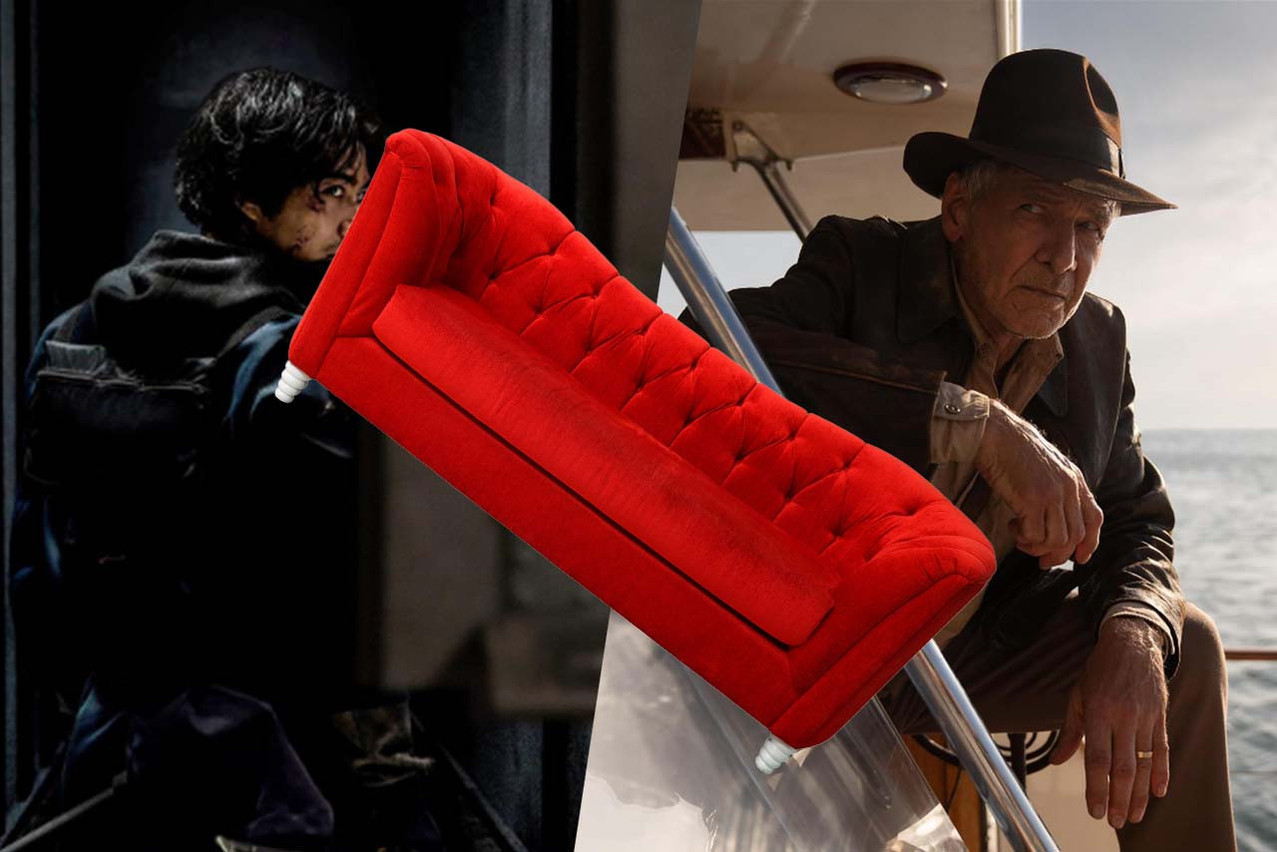Indiana Jones and the Dial of Destiny (2023)
Type of movie: Indiana Jones. It’s an Indiana Jones movie.
Did you know? The ancient Greeks invented time travel.
Jones rank: Third best out of five (no questions will be fielded).
A mild dysphonia in Harrison Ford’s voice is going to gnaw on your ear until the paradox takes shape--there’s an elderly voice in that young man’s body!--whereafter the brain must perform some additional calculus about wrinkles and the passage of time before understanding that, for good or ill, you’re looking at a deepfaked Indiana Jones. Ogling a youthfully hot Ford sounds initially like an unrelenting positive but somehow the voice (and the novelty of the special effects) belies the visual, leaving the viewer distractedly obsessing over how old the man actually is, in seeming anticipation whereof the movie supplies a slap-in-the-eyeball answer by--when it jumps forward in time--landing on an unfaked half-nude Ford whose age, meaning no disrespect, requires no calculus to understand.
Of course, this all amounts to an irrelevant (except to the actor denied the career-launching chance to play young Indiana Jones) production detail in the larger framework of the story, which is that a bunch of Nazis (it’s always Nazis) have stolen half of a wickedly powerful artefact called the Dial of Destiny, built by Archimedes to detect time fissures. A few decades after the war, in 1969, a not-so-former Nazi wants to find the other half of the dial and use it to go back in time to accomplish something dastardly (it’s always something dastardly), leaving Jones and his conspirators the politically-true-yet-somehow-milquetoast mission of stopping him dead in his goddamn Nazi tracks.
But for the movie’s conservatism vis-à-vis its formulaic reproduction of earlier Indiana Jonses--sadly, it is now unthinkable that any film company derivate even mildly from a copyrighted piece of established media, it being more financially bulletproof to kowtow to an imaginary lowest-denominator fan who wants the same thing they know and love--never mind that I have had to personally decanonise Star Wars episodes VII, VIII and IX because of their verisimilitude-annihilating and cloyingly pathetic aping of episodes IV, V and VI--anyway, but for the disappointment one may feel at this conservatism, at least the formula has been honed: it’s Harrison Ford repairing interpersonal relationships while racing against Nazis to find some near-magical historical object, and if you’re willing to steer into the nostalgia you may enjoy being inside a cinematic world that, like in earlier and more naïve epochs of American colonialism, remains enchanted by unknowns. The pace is good, the baddies are bad and Jones’s foil even has a spot of dynamism (just what is her motive!) and we can all enjoy some good old intellectual stagnation under the shiny, shiny lights.
House of Ninjas (2024)
Type of show: A three-generation family live in a big house but are secretly crime-fighting ninjas, except it’s dramatically coherent and not--despite what it sounds like--hokey.
Does the gra-- Yes, the grandma joins in the ass-kicking at some point.
Season two: Desired but, as of March 2024, unconfirmed.
When you see your big sister flitting across the roof in the middle of the night--or your grandma soundlessly appearing inside when seconds earlier you saw her outside--would you have the guts to think: maybe my whole family are secretly ninjas?
No, obviously. Nobody would. But this is the vantage point of Riku, the youngest member of the Tawara family, whose perspective works as a device that helps the audience tap into our own childlike wonder at the sheer kick-assery of it all. Riku is a minor character, however, and childlike wonder is hardly the point of the show, yet because the script treats an absurd premise (a retired ninja family coming back for one last Japan-saving job!) with genuine dramatic intensity and emotional complexity, Riku functions as a kind of permission slip: serious shit is going down but it’s okay to have fun.
Because, indeed, it’s a thriller: the longtime rivals of the Tawara family have resurfaced and are doing a bunch of creepy stuff in the woods (when they aren’t executing massive diabolics on national political levels), skullduggery that must be fought with espionage, blackmail and dance-based violence. That ticks the box for plot.
The show’s dramatic strength, meanwhile, comes from the ways in which the not-always-willing Tawaras are variously pulled into this job, processes often dimensionalised by third parties like bureaucrats or journalists getting thrown into the mix. The strongest of these dramatic churns is probably that of our main character, Haru, the revelation of whose stakes is perfectly paced with his gradual (re)accumulation of agency. Haru begins the show as a lovesick and guiltsick vending machine restocker who works nights, but ends it as a powerful agent who has faced down all of those sicknesses--and yet the triumph of his character is that, despite all that depth and growth, he never becomes something he hadn’t always been.
Oh, and towards the end, an all-female clan of ninjas turn up and they’re called the Guardians of the Demon Gate and we don’t know why. But I think everyone should know.
